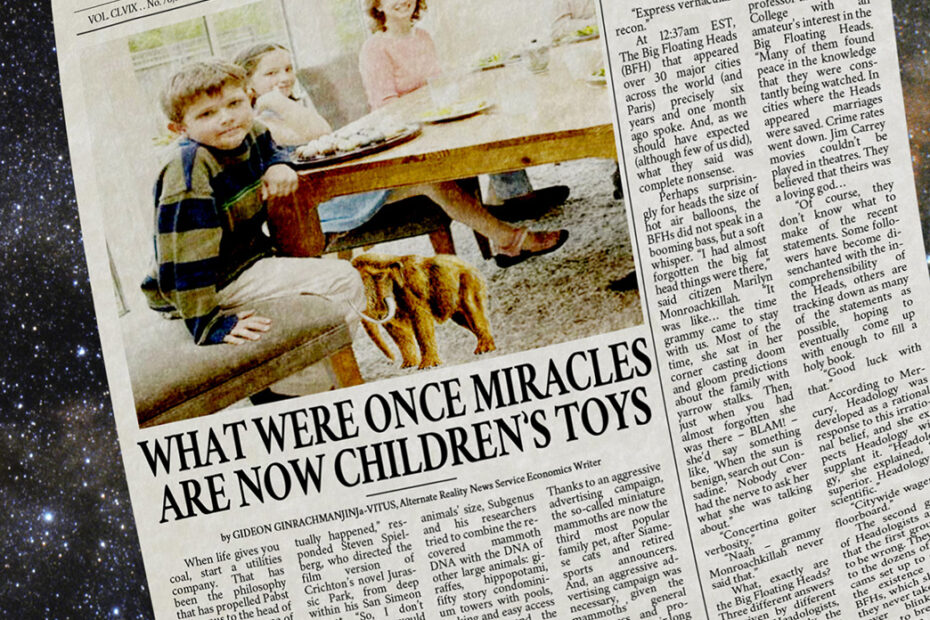by LAURIE NEIDERGAARDEN, Alternate Reality News Service Medical Writer
You’re not daydreaming: you have Mundane Intermittent Dissociative Disorder. You haven’t really come to hate your spouse: you have Progressively Diminishing Romantic Affect. You aren’t even happy: you are suffering from Abnormally Low Background Discontent Levels.
Welcome to the world of the recently released Diagnostic and Statistical Manual of Mental Disorders XIII, in which every emotional state a human being could experience is a psychological problem.
Doctor Carl Rorschach III (no relation to the ink blot guy), editor-in-chief of the DSM XIII, was excited by the volume’s release. “One can never be sure,” he stated, “but I think we’ve just about nailed the human psyche in this one.”
The print version of the DSM XIII runs to 127 volumes; only governments undaunted by running large deficits can afford to buy it. “Not that it matters,” Doctor Rorschach pointed out, “since we’re only publishing 12 copies of the DSM XIII in print. It will be available online for a very reasonable $19.95 a volume.”
Some critics of the DSM XIII have said that the environmental impact of publishing such a vast work in print will be devastating. Doctor Rorschach responded by accusing them of suffering from Advanced Environmental Concern Disorientation Syndrome, possibly combined with some degree of Stress Induced Post-environmental Nostalgia. “Besides,” he added, “I already said it will be available online. Do they have Encroaching Earwax Reticulosis or something?”
“The DSM XIII just doesn’t make any sense,” groused philosophy doctoral candidate P. Nicholas Heidegger (no relation to the famous phenomenologist). “If you don’t exercise enough, you’re diagnosed as having Oblique Sedentary Lifestyle Syndrome. If you exercise too much, you’re diagnosed as having Excessive Thanatic Physicality Disorder. Okay, nobody’s perfect. But, there’s no allowance for the possibility that people can live quite fulfilling – dare I say happy? – lives despite their flaws. It’s like…it’s like they took every aspect of the human condition and threw together three or four words ending in ‘syndrome’ or ‘disorder’ to explain it!”
Doctor Rorschach disagreed, claiming that the method by which the diagnoses were compiled was “highly scientific.” Although he refused to divulge just what that method was, a report in the latest GQ magazine suggests that it involved renting out the Vatican and using a lot of multicoloured smoke.
When I pressed the point, Doctor Rorschach asked, “Are you currently seeing a psychotherapist?” When I told him that I wasn’t, he stroked the goatee on his forehead and said, “Interesting. You know, Excessive Authority Questioning Syndrome can often be an early sign of deep-seated paranoia. I would get that looked after if I was you.”
I mumbled that I would.
Soon after the DSM XIII came out, the American Psychiatric Association announced that it had only identified one person in the United States who could be considered “sane” or “normal” by its standards Although it wouldn’t divulge her name, an intrepid reporter for the left-wing Huntington’s Post discovered that it was Amanda Puttinsky of Butterfield Falls, West Nevada. Soon after the announcement, Ms. Puttinsky, an elementary, my dear Watson school teacher, found herself under 24/7 scrutiny by the press.
Almost immediately, she started showing signs of irritability and fatigue. Two days after her identity was revealed, there was an awkward incident in a Wal-Mart where Puttinsky began shouting obscenities at a wall of grouters. Eventually, she retreated to her fashionable bungalow in Death Valley and refused to come out until the press left her alone (which, of course, only made journalists want to give her attention all the more). Within a week, the APA was reluctantly forced to retract its statement about her well-being.
“Media Induced Progressive Withdrawal Syndrome,” Doctor Rorschach tsked. “I have never witnessed such an advanced case!” He added that it was a shame, since the incident left the rest of us without an example of sanity to which we could aspire.
I asked Doctor Rorschach if we weren’t risking turning normal phases of human existence into medical problems.
“Are you perhaps referring to what we call Aggressive Philosophy Avoidance Disorder?” he asked in return. When I half-heartedly agreed, he answered, “I don’t think so. No.”
“That’s exactly what’s happening!” shouted Heidegger. “We’re medicalizing what should properly be the realm of philosophy, or religion, or…or daytime soap operas!”
“You don’t need to be Freud to see what his problem is,” Doctor Rorschach dismissively responded. “Denial!”
Nonetheless, Doctor Rorschach seemed to be avoiding the question. If every human activity is a sign of psychological imbalance, didn’t it make the whole concept of psychological illness meaningless?
“Life is a terminal neurotic state,” Doctor Rorschah commented with a sigh, “but we’re on the verge of finding the cure!”


